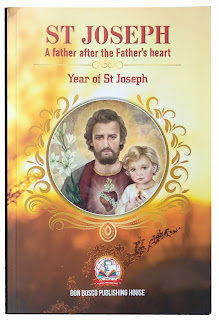Awaiting the Bridegroom
The gospel according to Matthew offers us the peculiar yet
popular parable of Jesus viz. the parable of the ten virgins (Mt 25:1-13). I
believe this parable has wonderful insights to offer us as we enter the season
of Advent.
A Time for
Stocktaking
“…ten virgins who took
their lamps and went out to meet the bridegroom”. The mention of a
bridegroom presupposes an imminent marriage and Advent is a call to all of us
(virgins), to prepare ourselves for
the coming of that Bridegroom who will soon be wedded to the humanity we all share
(cf. Jn 1:14). The preparation of the physical space for the bridegroom is
necessary and important but it must never substitute or overshadow a personal
preparation of one’s heart and mind. All of us are susceptible of falling into
the trap of conjuring up ostentatious celebrations which will demand elaborate
preparation and involve much time. In a society awash with consumerism and
materialism, it is possible that we will be tempted to adopt a flippant view of
Advent thus trivializing the Christmas mystery. Advent is a time for taking
stock of our lives, for examining our attitudes and our dominant and deficient behaviour
patterns and then working out strategies to re-align ourselves according to the
teachings of the Word of God and of the Church.
Yardstick of Fidelity
In the very opening lines of the parable we are told that
five of the virgins were wise and the other five were foolish. The first
noteworthy point that strikes the reader is that the call to prepare for the
bridegroom is a universal call (cf. Gal 3:28); to the foolish and the wise
alike. Jesus did not come to save only a section of humanity, rather he came to
save the entire human race (cf. Jn 3:16). Scripture scholars indicate the
standard for differentiating foolishness and wisdom is found in Mt 7:24, 26: “Everyone who listens to these words of mine
and acts on them will be like a wise man…everyone who listens to these words of
mine but does not act on them will be like a fool….” Keeping this yardstick
in mind we should examine ourselves to see if we should be defined as either foolish
or as wise. Do we hear (listens to these
words of mine) and practice (acts on
them) Jesus’ teachings or is our Faith lukewarm or apathetic?
The Oil of Good Works
All the virgins carried their lamps with them but only the
wise carried sufficient oil. Lamps stand for the Faith we share, while the oil represents
how we express this Faith in our lives - our works and our witness; what we do
to practice the teachings of Jesus and His Church in our daily lives. This
would include: following the commandment of love (Jn 14:34); being of service
to our neighbour (Lk 10:29-37); performing corporal and spiritual works of
mercy; keeping the precepts of the Church; practicing forgiveness (Lk 17:4; Mt
18:21-22); loving one’s enemies (Lk 6:27-29) and the list goes on. Since all
these Gospel precepts entail a personal commitment to a regular practice, they
cannot be vicariously shared but must be fulfilled individually and personally.
That was why, when suddenly the arrival of the Bridegroom was announced, the
foolish virgins had nothing, no oil left. What little they had was exhausted long
before the arrival of the Bridegroom.
May our Advent resolution this year be: a greater commitment
to practice the teachings of Jesus and the Church in their most practical form.
Strangely, it is not only we personally who will benefit from practicing our
Faith, but our families, colleagues, friends, society, the whole Church and
world too.
Tenacious Waiting
The Bridegroom, we are told, turned up at an unexpected
hour. Those who were ready went in with him. Pray that we be not caught unprepared
when that day comes. Pray that we have the tenacity to continuously strive to
do all the good we can, whenever we can, heeding St Paul’s advice: “And let us not grow weary in well doing,
for in due season we shall reap, if we do not lose heart.” (Gal 6:9). May
we never have to hear those awful words “I
do not know you!” Baptism alone is not the assurance of salvation, rather, it is a life lived doing
God’s will every day of our lives. The parable ends with the exhortation to be
prepared. Advent extends this same exhortation to us. In our efforts to prepare
for the Lord’s coming, may we not be so overwhelmed with the trinkets of
external celebrations that we completely neglect the most precious gift of all:
the Lord himself (cf. Lk 10:41). As we prepare to welcome the Lord into our
homes and into our lives more especially, may he find our lamps trimmed, our
flasks full of oil and we ourselves waiting joyfully for the coming of the
Christ Child.


Comments
Post a Comment